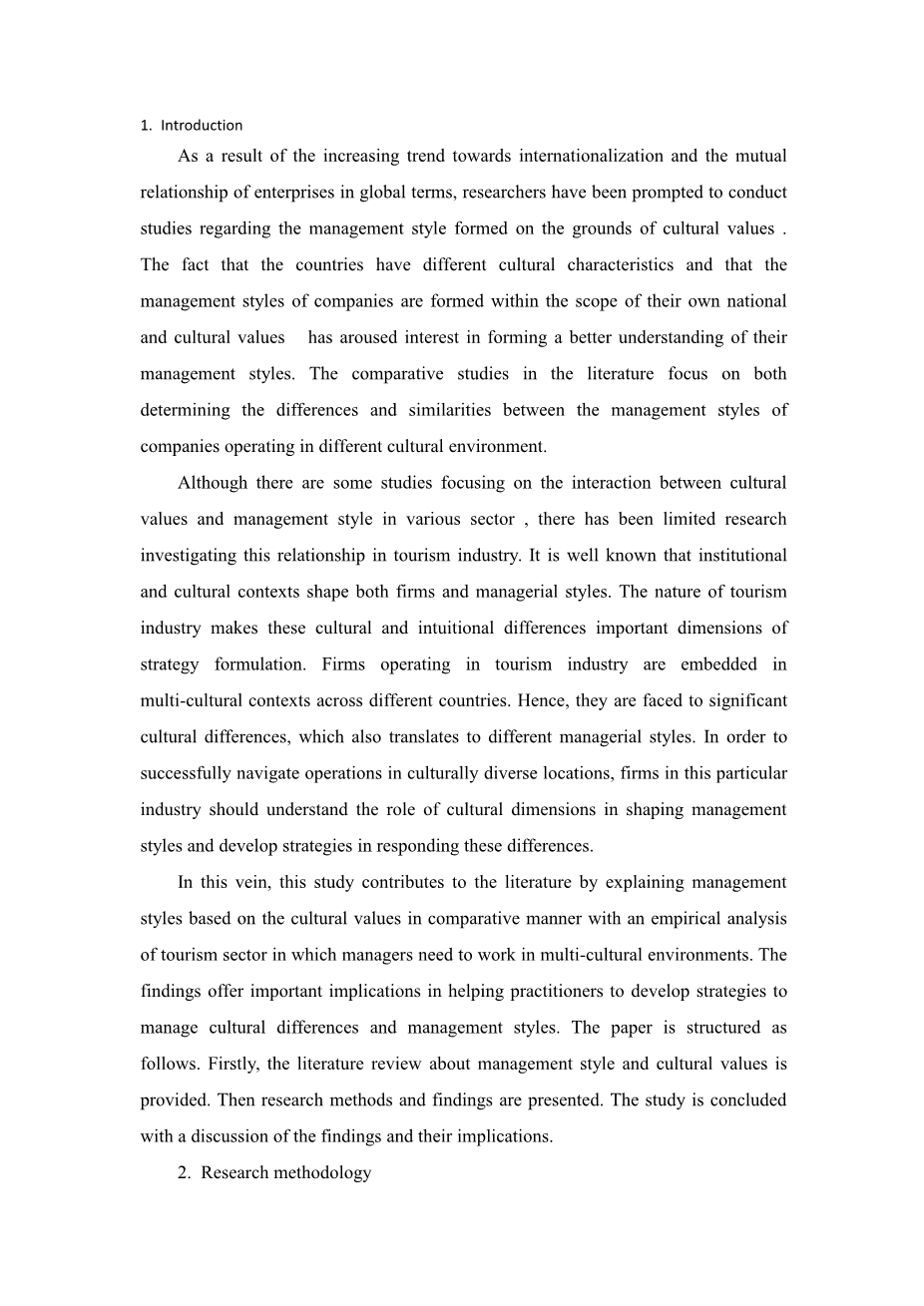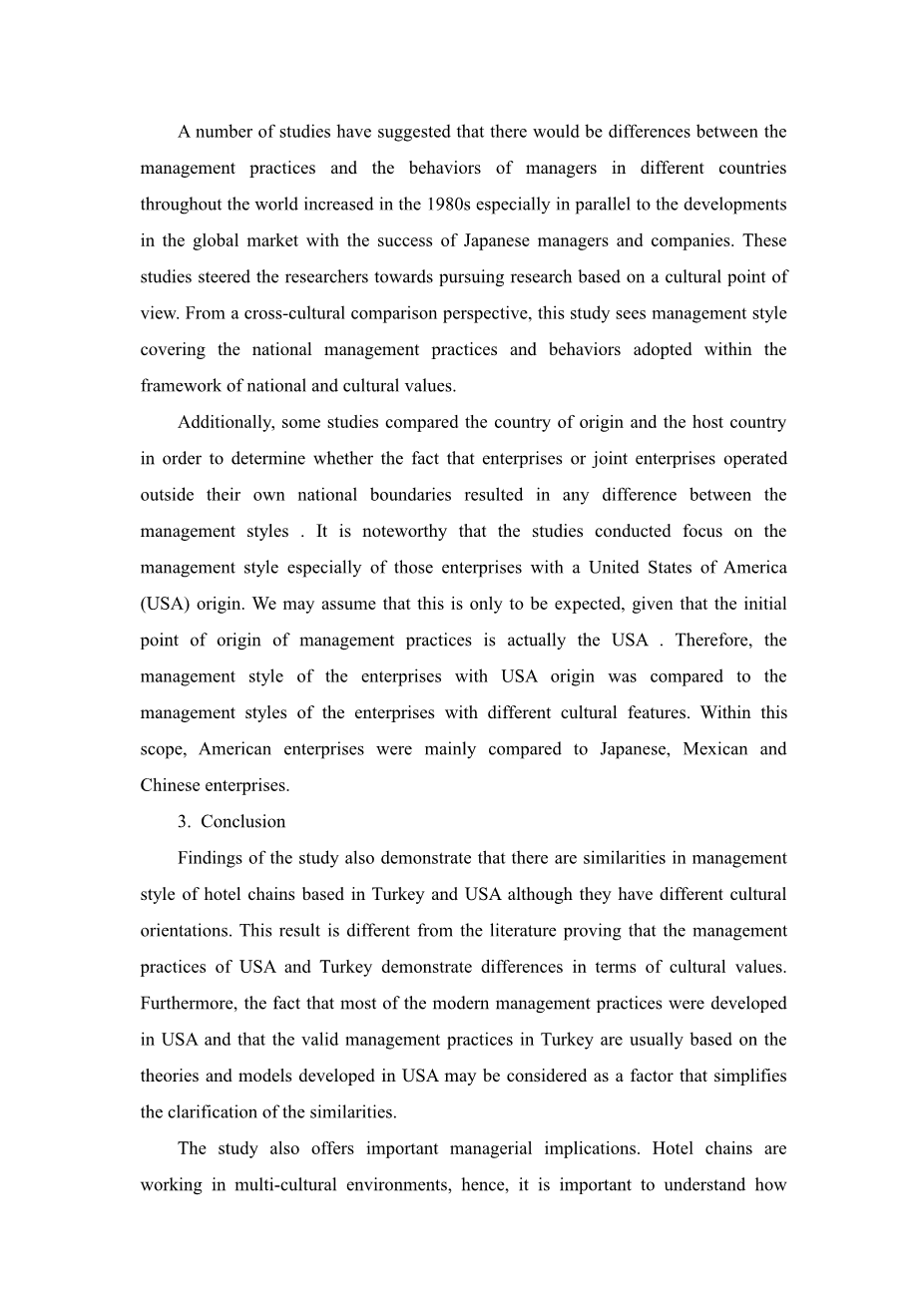

英语原文共 3 页,剩余内容已隐藏,支付完成后下载完整资料
土耳其本土和国外连锁酒店管理风格的比较:文化视角
1. 介绍
由于国际化的趋势以及全球范围内企业之间的相互关系,促使研究者对基于文化价值观而形成的管理风格进行研究。事实上,这些国家有不同的文化特征以及公司的管理风格是在其自身的国家和文化价值观范围内形成的已经引起了对其管理风格形成更好理解的兴趣。比较研究在文献中,重点是确定在不同文化环境中经营的公司的管理风格之间的差异和相似之处。虽然有一些研究集中在不同领域的文化价值观和管理风格之间的互动,有有限的研究调查旅游业的这种关系。
众所周知,制度和文化背景塑造了公司和管理风格。旅游业的性质使得这些文化和直觉的差异成为战略制定的重要维度。旅游企业在不同国家的多元文化背景下经营。因此,他们面临着巨大的文化差异,这也转化为不同的管理风格。为了在文化多样的地区成功地开展业务,这个特定行业的公司应该理解文化维度在塑造管理风格方面的作用,并制定应对这些差异的策略。在这方面,本研究有助于通过比较方式解释基于文化价值的管理风格,并对管理人员需要在多元文化环境中工作的旅游部门进行实证分析。研究结果提供了重要的启示,以帮助从业者发展策略,以管理文化差异和管理风格。本文的结构如下。首先,对管理风格和文化价值观的相关文献进行综述。然后介绍了研究方法和发现。研究的结论是对研究结果及其影响的讨论。
- 文献综述:管理风格与跨文化多样性
许多研究表明,在世界各地不同国家的管理实践和管理者的行为之间会有差异,在20世纪80年代有所增长,特别是随着日本经理人和公司在全球市场的成功发展。这些研究引导研究人员进行基于文化观点的研究从跨文化比较的角度来看,本研究看到的管理风格涵盖了国家和文化价值观框架内采用的国家管理实践和行为。以往的研究旨在证明管理风格在国家边界和共同文化价值观的框架内表现出相似性,而在文化多样性的框架内表现出差异性。着重于确定在世界不同地区经营的公司管理风格之间的相似和不同之处,而其他研究则集中于确定在同一地区经营的具有不同文化特征的企业管理风格之间的异同。
此外,一些研究比较了原籍国和东道国,以确定企业或合资企业在自己的国界之外经营的事实是否导致管理风格之间的任何差异。值得注意的是,所进行的研究集中在管理风格,特别是那些与美国起源的企业。我们可以假设这只是意料之中的,因为管理实践的最初起源点实际上是美国。因此,我们将美国本土企业的管理风格与具有不同文化特征的企业的管理风格进行比较。在此范围内,美国企业主要与日本企业进行比较,墨西哥和中国企业。
- 结论
研究结果还表明,土耳其和美国的连锁酒店虽然文化取向不同,但在管理风格上有相似之处。土耳其和美国连锁酒店的管理风格的维度显示出相似性,这可能与美国在国际酒店业处于领先地位有关(Ehtiyar, 2001)。因此,考虑到希尔顿酒店以及美国的连锁酒店自1955年以来一直在土耳其经营(希尔顿,2014),这有助于土耳其酒店管理意识的发展,这可以被认为是管理风格维度相似背后的另一个原因。另一方面,以现有文献为基础,对土耳其、法国、英国和美国社会管理风格的差异进行了总体比较。
这项研究也提供了重要的管理启示。连锁酒店是在多元文化环境中工作的,因此,了解文化价值观如何塑造管理风格,从而采取管理策略和实践来应对这些差异是很重要的。尽管了解这些差异及其对管理风格的影响对所有在这一行业经营的公司来说都至关重要,但连锁酒店,尤其是来自发达国家、将业务扩展到新兴市场的连锁酒店,应该花更多的精力了解当地环境。这主要是因为发达国家和新兴国家之间存在重大的制度和文化差异。因此,本研究的实证结果阐明了不同的管理风格出现作为文化差异的结果。因此,管理者可以理解文化差异如何导致不同的管理风格,以及他们应该如何制定在新兴市场地区的经营策略,这些地区最近已经成为热门的旅游目的地。
此外,还将对酒店和旅游业中的其他组织(如旅行社、餐饮公司、娱乐组织)进行研究,以便根据行业的特点比较具有不同文化特征的国家,将在决定差异方面做出重大贡献。由于比较研究的管理实践在旅游业是有限的,它是假定它将显著贡献的文献以及。调查酒店管理者之间的社交网络是否会影响本地和国外连锁酒店之间的管理实践流动,可能是未来研究的一个潜在途径。
- ntroduction
As a result of the increasing trend towards internationalization and the mutual relationship of enterprises in global terms, researchers have been prompted to conduct studies regarding the management style formed on the grounds of cultural values . The fact that the countries have different cultural characteristics and that the management styles of companies are formed within the scope of their own national and cultural values has aroused interest in forming a better understanding of their management styles. The comparative studies in the literature focus on both determining the differences and similarities between the management styles of companies operating in different cultural environment.
Although there are some studies focusing on the interaction between cultural values and management style in various sector , there has been limited research investigating this relationship in tourism industry. It is well known that institutional and cultural contexts shape both firms and managerial styles. The nature of tourism industry makes these cultural and intuitional differences important dimensions of strategy formulation. Firms operating in tourism industry are embedded in multi-cultural contexts across different countries. Hence, they are faced to significant cultural differences, which also translates to different managerial styles. In order to successfully navigate operations in culturally diverse locations, firms in this particular industry should understand the role of cultural dimensions in shaping management styles and develop strategies in responding these differences.
In this vein, this study contributes to the literature by explaining management styles based on the cultural values in comparative manner with an empirical analysis of tourism sector in which managers need to work in multi-cultural environments. The findings offer important implications in helping practitioners to develop strategies to manage cultural differences and management styles. The paper is structured as follows. Firstly, the literature review about management style and cultural values is provided. Then research methods and findings are presented. The study is concluded with a discussion of the findings and their implications.
- Research methodology
A number of studies have suggested that there would be differences between the management practices and the behaviors of managers in different countries throughout the world increased in the 1980s especially in parallel to the developments in the global market with the success of Japanese managers and companies. These studies steered the researchers towards pursuing research based on a cultural point of view. From a cross-cultural comparison perspective, this study sees management style covering the national management practices and behaviors adopted within the framework of national and cultural values.
Additionally, some studies compared the country of origin and the host country in order to determine whether the fact that enterprises or joint enterprises operated outside their own national boundaries resulted in any difference between the management styles . It is noteworthy that the studies conducted focus on the management style especially of those enterprises with a United States of America (USA) origin. We may assume that this is only to be expected, given that the initial point of origin of management practices is actually the USA . Therefore, the management style of the enterprises with USA origin was compared to the management styles of the enterprises with different cultural features. Within this scope, American enterprises were mainly compared to Japanese, Mexican and Chinese enterprises.
- Conclusion
Findings of the study also demonstrate that there are similarities in management style of hotel chains based in Turkey and USA although they have different cultural orientations. This result is different from the literature proving that the management practices of USA and Turkey demonstrate differences in terms of cultural values. Furthermore, the fact that most
剩余内容已隐藏,支付完成后下载完整资料
资料编号:[605555],资料为PDF文档或Word文档,PDF文档可免费转换为Word


